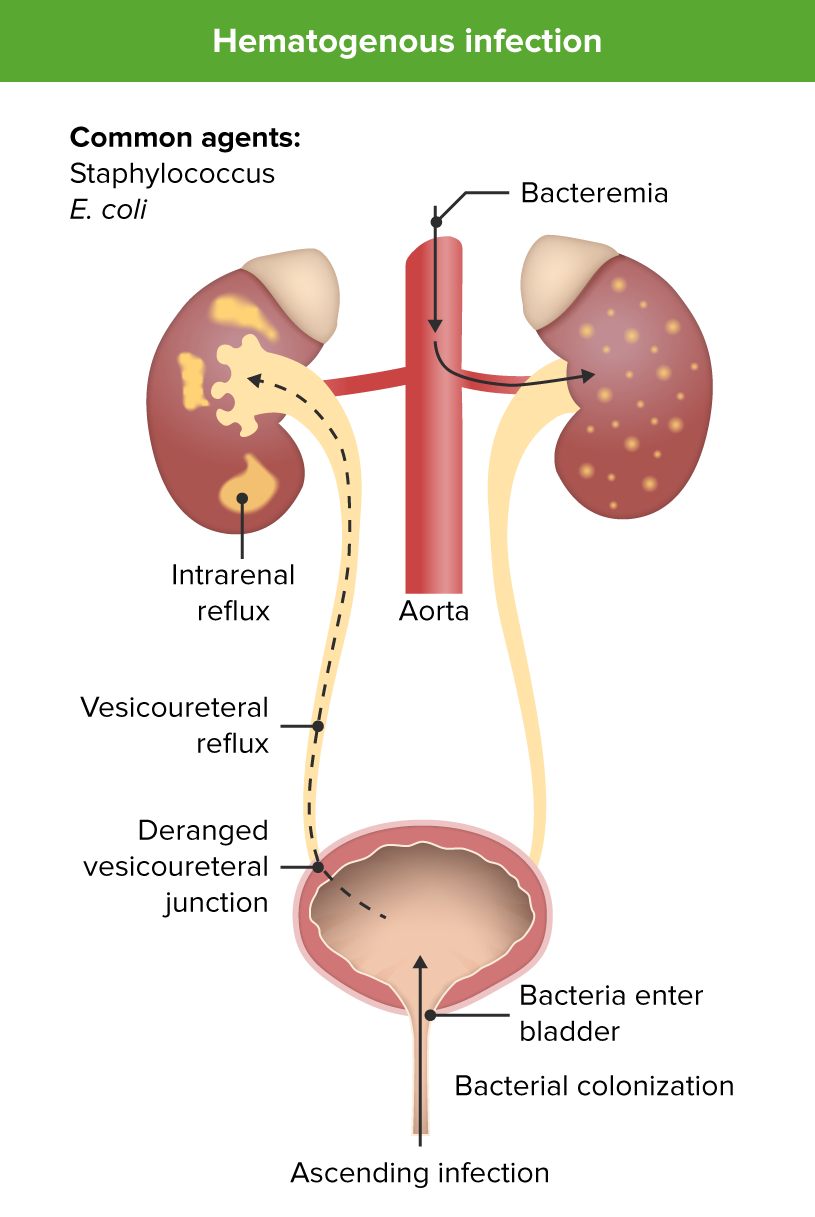Playlist
Show Playlist
Hide Playlist
Urinary Tract Infections (UTI, Bladder Infection) in Children: Underlying Renal Abnormalities & Prevention
-
Slides UTI Pediatrics.pdf
-
Download Lecture Overview
00:00 If we see an infant with or a child with a urinary tract infection, we have to wonder if there are underlying renal problems. This is especially true of infants under 2 years of age. If you see an infant under 2 years of age, most people would suggest you should think about the possibility of underlying renal pathology such as vesicoureteral reflux. Other options they might have are UPJ obstruction and post urethral valve especially in boys. The thing is is that if you screen everyone for underlying renal pathology, you’re probably doing too much testing and you may be irradiating children unnecessarily especially if you’re doing vesicoureteral reflux. So, what do we do? The AAP Guidelines currently recommends an ultrasound after a urinary tract infection and if the ultrasound is abnormal, preceding to a VCUG. Alternatively, they recommend that if the patient is having a subsequent urinary tract infection, going straight to the VCUG. Some people recommend that the ultrasound is a poor screening test and we should just do away with that entirely and simply do a VCUG after a second UTI. This is a fairly complex and controversial thing. Many urologists recommend all testing right after the first UTI. So, why does it matter that we screen for this vesicoureteral reflux? Remember, there are different stages of vesicoureteral reflux. There are stages I and II where predominantly it’s not the kidney that’s involved but rather the ureter. More than 80% of these patients, it will resolve on its own. So it’s really unclear that we need to screen for these patients. The other thing though is the vast majority of patients with reflux have types I and II. So, your likelihood of finding types III, IV and V is very low and you have to screen a lot of children before you’ll find one. Also, if we treat III, IV and V, our treatment is not necessarily particularly effective. So let’s look at III, IV and V. III we have blunting of the calyces, IV it gets worse and V is the megaureter. These will resolve on their own without intervention in a percentage of patients. About half of III and about a third of IV and about 10% of V will resolve on their own. So, screening for underlying renal problems is controversial. It’s unclear that screening for problems actually improves outcomes that we care about like scarring. We might, maybe, prevent some urinary tract infections but if we’re not affecting long term out of the kidney is that really that important. How do we screen? We can screen for ultrasound which is a poor test for screening, we can do VCUG or voiding cystourethrogram, or we can do a DMSA scan. Voiding cystourethrogram is when you inject dye into the bladder and then have the child forcefully pee, it hurts. The child who has vesicoureteral reflux, you’ll see the dye going backwards up their ureters. In the DMSA scan, we inject the child through the vein with the radionucleotide which will show areas of renal scarring or renal involvement and is a good way of showing what is the function of that kidney right now but perhaps the most important way to prevent UTI in all these children is to treat constipation. Even among children with known vesicoureteral reflux, a huge percentage of them have constipation as their trigger for their UTI. So, whenever you see a child with urinary tract infection, check and ask about constipation and treat it aggressively. What’s controversial in Pediatrics is UTI prophylaxis. I confess, I am not a fan personally, there are other people who feel otherwise. The problem is is that it prevents UTI but it prevents it very badly. According to the largest study ever done in these children with vesicoureteral reflux, it took more than 6,000 doses of Bactrim to prevent 1 single urinary tract infection and 1 UTI can be treated with only 20 doses of Bactrim. Also, in that study, preventing UTIs by providing Bactrim every day had no impact whatsoever on renal scarring, which is the thing we actually care about the most. 04:32 There is the opportunity to also prevent surgically. There are a couple different surgical approaches to patients with vesicoureteral reflux. You can do re-implantation of the ureter into the bladder wall or you might inject a polymer to offer a little bit of resistance to backwards flowing urine. Generally, according to the largest Cochrane view, it takes an average of 9 surgeries to prevent 1 UTI and surgery does not prevent scarring. So, similar to medication therapy, surgical repair doesn’t seem to do anything and many people ask “Why is rapid screening for vesicoureteral reflux so important if neither our medical nor our surgical repair of the problem is particularly effective?” So, this is the controversy around UTIs and how we screen for underlying problems and I hope I have been able to outline for you the general management of UTIs in Children. Thanks for your time.
About the Lecture
The lecture Urinary Tract Infections (UTI, Bladder Infection) in Children: Underlying Renal Abnormalities & Prevention by Brian Alverson, MD is from the course Pediatric Infectious Diseases. It contains the following chapters:
- Underlying Renal Abnormalities
- Prevention of Urinary Tract Infections
Included Quiz Questions
Which of the following interventions has a the highest rate of prevention of recurrent urinary tract infections with the lowest cost in children?
- Prevention of constipation
- Prophylactic antibiotics
- Ureteral reimplantation surgery
- Injection of polymer in the ureters to prevent reflux
- Kidney transplant
At which grade of hydronephrosis is blunting of calyces seen ?
- Grade III
- Grade IV
- Grade V
- Grade I
- Grade II
Which screening method is useful for detecting renal scarring of the kidney?
- DMSA scan
- Ultrasound
- Voiding cystourethrogram
- Urinalysis
- X-ray
Customer reviews
5,0 of 5 stars
| 5 Stars |
|
1 |
| 4 Stars |
|
0 |
| 3 Stars |
|
0 |
| 2 Stars |
|
0 |
| 1 Star |
|
0 |
Excellent lecture as usual. I was not aware until today about this controversy. I am not sure all of my colleagues are aware of it either. Thank you!




